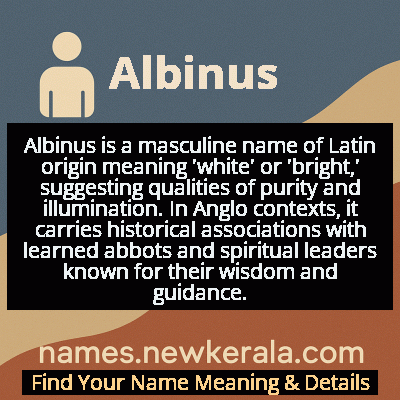Albinus Name Meaning & Details
Origin, Popularity, Numerology Analysis & Name Meaning of Albinus
Discover the origin, meaning, and cultural significance of the name ALBINUS. Delve into its historical roots and explore the lasting impact it has had on communities and traditions.
Name
Albinus
Gender
Male
Origin
Anglo
Lucky Number
6
Meaning of the Name - Albinus
Albinus is a masculine name of Latin origin meaning 'white' or 'bright,' suggesting qualities of purity and illumination. In Anglo contexts, it carries historical associations with learned abbots and spiritual leaders known for their wisdom and guidance.
Albinus - Complete Numerology Analysis
Your Numerology Number
Based on Pythagorean Numerology System
Ruling Planet
Venus
Positive Nature
Harmonious, responsible, caring, and artistic.
Negative Traits
Overly idealistic, superficial, possessive, or jealous.
Lucky Colours
Pink, turquoise.
Lucky Days
Friday.
Lucky Stones
Diamond, turquoise.
Harmony Numbers
2, 3, 9.
Best Suited Professions
Artists, musicians, teachers, healthcare workers.
What People Like About You
Warmth, nurturing nature, artistic flair.
Famous People Named Albinus
Albinus of Canterbury
Abbot and Archbishop
First Archbishop of Canterbury appointed by papal authority
Albinus of Angers
Bishop and Saint
Founded monasteries and renowned for piety and charitable works
Albinus Flaccus
Scholar and Theologian
Leading scholar at Charlemagne's court during Carolingian Renaissance
Albinus of Buraburg
Missionary Bishop
Key figure in Christianizing Germanic tribes in Saxony
Name Variations & International Equivalents
Click on blue names to explore their detailed meanings. Gray names with will be available soon.
Cultural & Historical Significance
The name's association with learned abbots and bishops reinforced its connection to intellectual leadership and spiritual guidance throughout the Middle Ages, particularly in monastic communities where Latin names symbolized connection to the broader Christian world. In Anglo-Saxon England, names like Albinus represented the integration of Roman Christian culture with local traditions, serving as markers of educated status and religious authority. The continued use of the name in ecclesiastical contexts preserved its cultural significance long after the medieval period, maintaining its association with scholarly pursuit and spiritual leadership.
Extended Personality Analysis
Individuals named Albinus are typically associated with intellectual depth, spiritual sensitivity, and leadership qualities. The name's historical connection to abbots and scholars suggests a personality inclined toward contemplation, wisdom, and organizational ability. These individuals often demonstrate strong moral convictions and a methodical approach to problem-solving, combined with a natural authority that inspires confidence in others. Their thoughtful nature makes them excellent counselors and mentors, while their historical associations suggest resilience in maintaining principles and traditions.
The name carries an air of dignified seriousness, yet also implies compassion and dedication to serving others, reflecting the monastic ideals of its most famous bearers throughout history. People with this name are often perceived as reliable, principled, and intellectually curious, with a tendency toward careful consideration rather than impulsive action. Their association with historical figures of learning and spiritual leadership suggests individuals who value knowledge, tradition, and meaningful contribution to their communities. The name implies a balance between inner reflection and outward service, creating a personality profile of someone both deeply thoughtful and practically effective.
Modern Usage & Popularity
In contemporary times, Albinus remains a rare but respected name, primarily used in academic, historical, or religious contexts. While not commonly given to newborns, it occasionally appears in families with strong historical or ecclesiastical connections, particularly those with Anglo-Saxon or medieval heritage. The name has seen slight revivals among parents seeking distinctive classical names with deep historical roots, though it remains outside mainstream naming trends. In modern usage, it's more frequently encountered as a surname or in scholarly references rather than as a first name, maintaining its antique charm and scholarly associations while avoiding widespread popularity.
Symbolic & Spiritual Meanings
Symbolically, Albinus represents purity, wisdom, and spiritual enlightenment. The root meaning of 'white' connects to concepts of innocence, clarity, and divine illumination across multiple cultural traditions. In Christian symbolism, white signifies baptismal purity and heavenly grace, aligning with the name's ecclesiastical heritage and association with saintly figures. The name also carries strong connotations of intellectual light and enlightenment, representing the pursuit of knowledge and truth through disciplined study and contemplation. As a symbolic bridge between earthly and spiritual realms, Albinus embodies the ideal of guided leadership—combining practical wisdom with higher spiritual understanding, and suggesting a personality that illuminates darkness through both knowledge and moral clarity.

